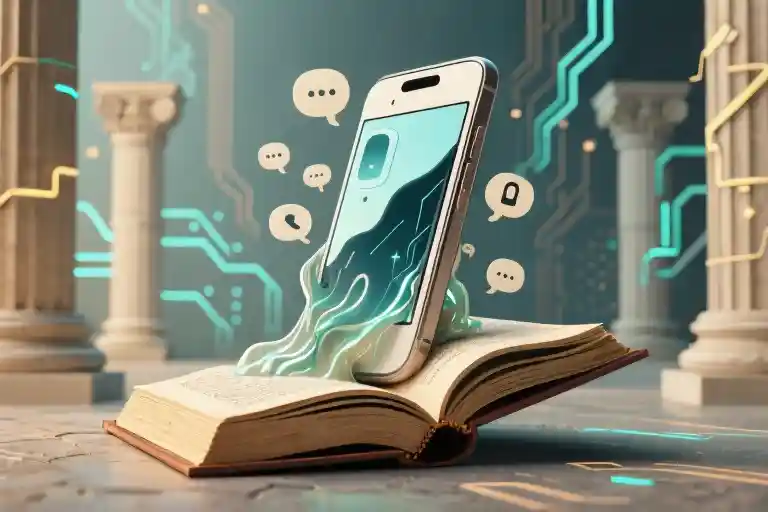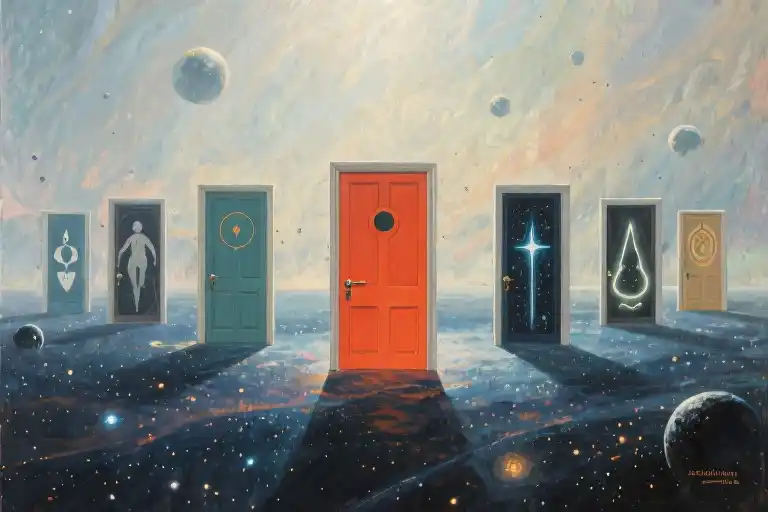The screen lights up with its weekly report: 27 hours spent staring at this rectangle of glass, 1,200 notifications swiped away, 47 minutes of ‘productive’ reading. Then the existential questions creep in during that rare moment of digital silence – does life have meaning? What even is ‘meaning’ when our attention spans resemble overcooked spaghetti? That notification about your friend’s vacation photos just derailed your train of thought about free will. Or was it free won’t? Your thumb hovers over the Instagram icon while your brain stages a mutiny: Are you running the app or is the app running you?
Rilke’s advice about living the questions feels almost quaint now. In 1903, waiting weeks for a handwritten reply built contemplation into the architecture of correspondence. Today we experience philosophical whiplash – deep questions about consciousness interrupted by TikTok dances, existential dread punctuated by lunch delivery notifications. The poet suggested we ‘gradually…live along some distant day into the answer.’ Our apps promise answers before the sentence finishes loading.
This tension creates a peculiar modern condition: We’ve democratized access to the great philosophical questions (‘Is there a God?’ sits comfortably beside ‘What’s for dinner?’ in our mental browsers) while eliminating the buffer zones needed to process them. The result isn’t wisdom but what I’ve come to call ‘existential buffering’ – that spinning wheel of the soul when profound queries outpace our processing power.
Perhaps this explains why my brain treats Rilke’s letters like an unskippable YouTube ad. His counsel to ‘be patient toward all that is unsolved’ collides with my neural pathways rewired for instant resolution. The same device holding his complete works also contains seven tabs debating whether free will exists, a half-written tweet about absurdism, and a shopping cart with ethically sourced coffee I’ll never buy. We’ve become walking contradictions – carrying millennia of accumulated wisdom in our pockets while struggling to focus long enough to absorb a single paragraph.
The real philosophical test isn’t some abstract thought experiment. It’s what happens when you notice yourself reaching for your phone while reading this sentence about noticing yourself reach for your phone. That’s the modern iteration of Descartes’ cogito: I scroll, therefore I…what exactly?
Somewhere between the push notifications and the pull of timeless questions, we’re all conducting accidental philosophy. Every time you pause your doomscrolling to wonder why you’re doomscrolling, every moment you question whether your choices are truly yours while algorithmically recommended content questions you back – these are the contemporary forms of Rilke’s ‘living the questions.’ The medium has changed, but the human struggle remains comfortingly, frustratingly familiar.
The 1903 Mind Repair Toolkit
Rilke’s advice to “live the questions” arrives like a handwritten letter slipped under the door of our digital age – slightly crumpled, smelling of ink and patience. That 1903 postmark might as well be from another galaxy. His world operated on what we’d now call painfully slow bandwidth: letters traveling by horse-drawn carriages, thoughts marinating for weeks between correspondents, answers arriving only after the original anxiety had fossilized into something more manageable.
Paper had its own physics. Ideas moved at the speed of dipping pens, forcing what neuroscientists now recognize as cognitive spacing – those white margins around thoughts where meaning could breathe. The mechanical rhythm of writing by hand created natural buffers against what we currently experience as mental traffic jams. Rilke’s “be patient toward all that is unsolved” wasn’t spiritual advice so much as a technical requirement of his era’s information technology.
Our brains now function like browser windows with 37 tabs open – some frozen mid-load, others autoplaying videos we didn’t click. The constant pings have rewired our relationship with uncertainty itself. Where Rilke’s contemporaries might stare at an unanswered letter for days, we experience three unanswered texts as existential abandonment. That little typing bubble on iMessage has become the Rorschach test of our digital souls.
The real casualty isn’t our attention spans, but what philosopher Simone Weil called “the grace of empty time” – those unproductive gaps where questions could stretch and yawn. Modern productivity hacks have eliminated the buffer zones where Rilke’s kind of understanding gestated. We’ve outsourced patience to loading icons, mistaking buffering for thinking.
Yet something primal still recognizes the wisdom in Rilke’s antique prescription. When he suggests we “gradually, without noticing it, live along some distant day into the answer,” he’s describing what cognitive scientists call the incubation period – the mysterious way solutions emerge when we stop consciously grinding at problems. Our apps have deleted this vital pause, replacing it with the illusion of instant resolution through frantic Googling and crowdsourced opinions.
Perhaps we need to recover what the Japanese call ma – the intentional space between things. Not meditation apps with their achievement-oriented streaks, but actual blank intervals where nothing is solved or optimized. The kind of emptiness where a 1903 letter could cross continents slowly, collecting meaning along the way.
Digital Umbilical Entanglement Syndrome
The notification ping is the new primal scream. We exist in a perpetual state of interrupted becoming, where every unanswered text message becomes an existential crisis wrapped in read receipts. This isn’t multitasking—it’s mental archaeology, with layers of attention fragmented like shards in a digital dig site.
The Philosophy of Read Receipts
That tiny ‘Seen’ timestamp holds more existential weight than most philosophy textbooks. The ancient Greeks debated the nature of being; we agonize over being left on ‘Delivered.’ There’s a particular modern agony in watching someone’s profile picture change while your heartfelt message fossilizes in their inbox. It’s enough to make Sartre rewrite Being and Nothingness as Texting and Ghosting.
Our brains now operate on what neurologists call ‘continuous partial attention,’ though it feels more like trying to drink from a firehose while riding a unicycle. The average attention span has shrunk to less than a goldfish’s—eight seconds, down from twelve in the year 2000. We’ve sacrificed depth for the dopamine hit of the infinite scroll, trading contemplation for the cheap thrill of the pull-to-refresh gesture.
The Double-Bellybutton Theory
Humanity has developed a new cognitive anatomy. The innies and outies aren’t just about naval configurations anymore—they describe how we process reality in the digital age.
Innies (internal processors) try to maintain some semblance of inner life amidst the chaos. Their thoughts buffer like old YouTube videos, constantly pausing to load. Outies (external validators) broadcast their consciousness across social platforms, treating Instagram Stories as synaptic firings. Most of us are some Frankensteined combination—one mental foot in the stream, the other desperately grasping for solid ground.
The true modern madness reveals itself when we catch ourselves: checking emails during meditation apps, reading philosophy tweets while binge-watching Netflix, or—most tragically—feeling genuine anxiety when separated from our charging cables. We’ve become spiritual centaurs, half flesh and half algorithm.
The Freedom of Unchoosing
Here’s the paradox: we’ve never had more options, yet feel increasingly powerless over our choices. The ‘free won’t’ muscle—our ability to resist the digital siren calls—atrophies daily. That moment when you open your phone ‘just to check the time’ and emerge thirty minutes later from a TikTok rabbit hole? That’s free won’t in action (or rather, inaction).
Our apps are designed to exploit this weakness. Infinite scroll eliminates natural stopping points. Autoplay removes decision friction. Push notifications hijack our attention like neurological carjackers. The greatest modern act of willpower might be closing a browser tab without finishing the article.
Yet within this entanglement lies an odd liberation. Recognizing our digital dependencies can become the first step toward intentional living. The solution isn’t Luddite rejection, but conscious engagement—learning to hold our devices like meditation bowls rather than emergency oxygen masks. After all, even Rilke needed to set down his pen occasionally to let the ink dry.
The Belly Button Theory of Personality
The way your belly button folds says more about your existential wiring than any personality quiz ever could. Innie thinkers process life like a carefully curated local storage – every experience gets inspected, tagged and filed for future reference before allowing entry. Outie minds operate like cloud servers, constantly syncing with the external world in real-time but struggling with offline mode.
This isn’t just anatomical curiosity. Your navel type reveals your fundamental operating system for handling life’s big questions. Those with innie configurations tend to approach free will like a suspicious food critic – sampling small bites of decisions, letting them simmer in mental crockpots before committing. Their existential GPS always shows “recalculating” because every possible route must be examined.
Outies, meanwhile, treat choice like a fast-food drive-thru. The menu of possibilities flashes by, and before the cashier finishes asking about fries, they’ve already shouted their order into the void. This explains why outies accumulate more Uber Eats receipts than life regrets – decisive action over endless deliberation.
Your food delivery history might be the most honest personality test you’ll ever take. Scroll through your past orders and you’ll uncover patterns more revealing than Rorschach blots:
- The chronic order-editor (innie) who changes their sushi selection three times before checkout
- The impulse-buyer (outie) who adds mochi ice cream because the app blinked at them suggestively
- The paralyzed scroller (innie-outie hybrid) who starves while debating pho versus ramen meaning
This isn’t about judging your dumpling decisions. Those tiny takeout choices mirror how you navigate life’s buffet. The innie’s “free won’t” muscle flexes constantly, vetoing options to avoid decision fatigue. Outies exercise “free will” like kids in candy stores, grabbing first and rationalizing later.
Neither approach is superior – just different coping mechanisms for an overwhelming world. Your belly button doesn’t determine destiny, but it does hint at whether your soul runs on iOS (carefully sandboxed experiences) or Android (open-source chaos). The wisest among us learn to toggle between both systems when the existential wifi gets spotty.
The Existential Takeout Menu
Your phone pings with a dinner reminder just as you’re contemplating whether free will exists. The universe has ironic timing – here you are trying to determine if your choices are truly yours while staring at three identical food delivery apps. This is where philosophy gets real: in the fluorescent glow of your refrigerator at 8:47pm.
Decision fatigue isn’t just about what to eat. That blinking cursor on the Seamless search bar becomes modern humanity’s most frequent encounter with what philosophers call ‘the burden of choice.’ We’ve mistaken infinite options for freedom when really, we’re just practicing what neuroscientists term ‘decision quicksand’ – the more we struggle to choose, the deeper we sink into paralysis.
Enter the concept of ‘free won’t’ – that peculiar modern resistance to making any choice at all. You’ve experienced this: scrolling past hundreds of restaurants only to reheat leftovers. It’s not that you can’t decide; you’re actively deciding not to decide. Behavioral economists call this ‘choice deferral,’ but let’s be honest – it’s the culinary equivalent of staring at your life’s potential and ordering the philosophical equivalent of plain toast.
Here’s the existential kitchen experiment: For three days, document every dinner decision point. Not just what you ate, but the micro-choices leading there. Did you open the fridge first or the app? How many times did you toggle between cuisine types? That moment when you almost picked the salad but then… didn’t? That’s free won’t in action – the shadow version of free will we rarely acknowledge.
What emerges isn’t just a meal log but a startling map of your cognitive biases. The Thai place you always default to? That’s your brain’s heuristic shortcut at work. The new vegan spot you considered for 12 minutes before abandoning? That’s what psychologists call ‘maximizer behavior’ – the exhausting pursuit of an optimal choice that may not exist. Your occasional cereal-for-dinner rebellions? Pure existential improvisation.
Rilke advised living the questions, but he never had to navigate a 20% off promo code deadline. Yet perhaps our mundane food struggles hold the key: every dinner dilemma is a tiny rehearsal for life’s bigger uncertainties. The way you handle ‘tacos or sushi tonight’ mirrors how you approach ‘purpose or paycheck’ in your career. Your relationship with the takeout menu might reveal more about your relationship with freedom than any philosophy textbook.
So tonight, when you’re once again hovering over the order button, notice what happens in that suspended moment. That’s where free will and free won’t duke it out – not in some abstract debate, but in the very real tension between your hunger and your hesitation. The meaning of life might remain elusive, but the meaning behind your dinner choice? That’s a story even Rilke would find delicious.
The God/Dinner Paradox Revisited
We end where we began – caught between cosmic inquiries and mundane decisions. The same mind that ponders divine existence will, within minutes, agonize over sushi versus tacos. This cognitive whiplash defines our era: philosophers with notification anxiety, mystics checking delivery status.
That persistent ping from your pocket isn’t just another app alert. It’s modernity’s Socratic gadfly, constantly interrupting your deepest thoughts with urgent trivialities. Rilke’s “live the questions” becomes a radical act when our devices demand immediate answers – to everything except what truly matters.
Here’s the existential joke we’re all trapped in: Your free will manifests most powerfully when resisting the dessert menu, while your “free won’t” collapses spectacularly against the infinite scroll. We’ve become walking paradoxes – capable of debating determinism for hours, yet helpless against autoplay algorithms.
Join the #PhilosophyBellyButton Challenge
Let’s make our contradictions visible. Post a photo of:
- Your actual belly button (innie/outie)
- Your last existential search history
- The takeout order that defeated your free will
Tag it with what you resisted today (#FreeWontWin) or surrendered to (#AlgorithmAteMySoul). The most honest confession gets a digital copy of Rilke’s letters – delivered instantly, because irony tastes better warm.
Your screen dims. A translucent countdown appears: 3 seconds until reality resumes…
2…
1…
Did you make a conscious choice to keep reading? Or was that just another neural subroutine firing? Either way – welcome back to the beautiful, frustrating, meaning-making mess we call being human.





